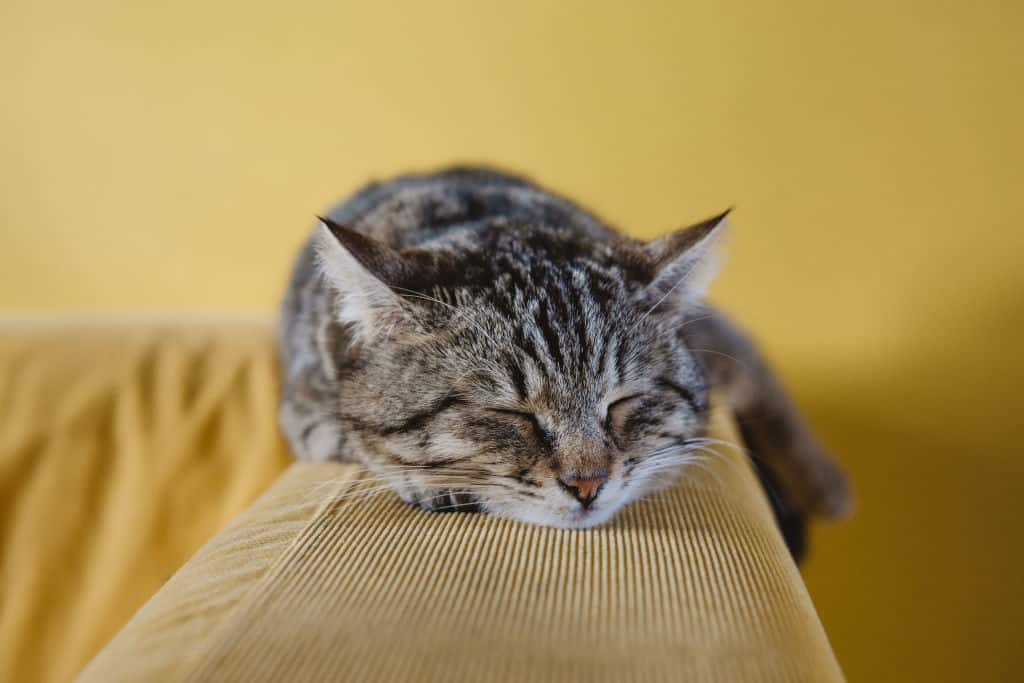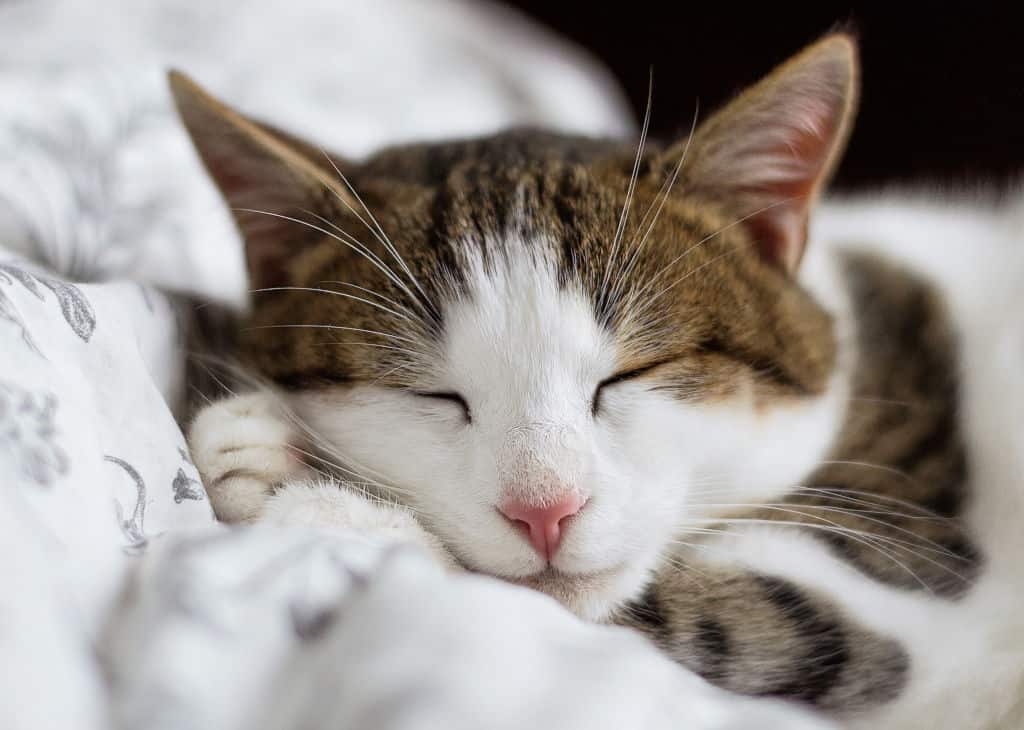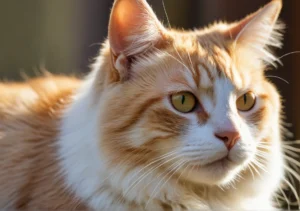Mammals, such as humans and cats, are all capable of dreaming. If that’s true, some dreams are probably good, while others are bad. If your cat has a bad dream, what can you do?
Kittens may have disturbing dreams at some point. There’s not much you can do but pet and comfort them and wait for them to grow out of it.
This article explores the causes of bad dreams in cats, signs of cat nightmares, and what to do if your cat has bad dreams.

Can Cats Have Bad Dreams and Nightmares?
When you observe a cat sleep, you may see that it makes faces and noises and frequently moves its limbs as if it is rushing after or away from something. It demonstrates that they are having a dream while sleeping.
Cats, during their REM sleep, dive deep into a realm of dreams that could range from reliving experiences to exploring new territories. Their brain activity can show patterns akin to ours when we dream vividly.
One of my cats is four years old, and I’m sure he has dreams from time to time. He twitches and makes strange noises. He used to make a little noise when sleeping and will occasionally wake up and make a noise to see if I was there. Turned out my cat was stressed from moving to a new apartment.
Moving can disrupt a cat’s sense of territory and security. Such profound changes in their environment could, in theory, influence the nature of their dreams, making them more prone to nightmares.
This would mean that some rescue cats may have terrifying nightmares. I’ve heard of many rescued cats and dogs experiencing awful dreams due to previous traumatic experiences, and it takes time for them to overcome this and adjust to a new, loving environment.
If the cat is experiencing pain, it may have nightmares. If this is a new activity for your cat, something may irritate them, whether it’s their fur, food, or illness.
Your cat may have dreams due to the stress of moving or have a medical problem such as seizures. If that’s the case, it is best not to make any changes to their routine or diet and take them to the vet.
How Can You Tell if Your Cat Is Having a Nightmare?
It can be challenging to figure out if a cat is having a nightmare because they don’t always show the same physical indicators of dreams as humans.
However, abrupt movements or vocalizations during sleep, such as twitching, meowing, growling, or hissing, can indicate that a cat is having a nightmare. Cats may sleep restlessly, move around more frequently, or appear disturbed while waking up.
If you find your cat engaging in any of these activities, it could indicate that they are having a nightmare. It is also crucial to note that while cats may have typical dream states, they may also have a medical issue that causes agitation when sleeping.
If you are concerned about your cat’s sleeping habits, you should always visit a veterinarian. If your cat gets stressed from visiting a vet, check out our guide for stress-free vet visits.
Cats sleep with their paws, ears, tail twitching, and even soft meows or huffs. However, they are not always bad nightmares. They may appear to have nightmares, but they could simply be chasing birds and mice.
Can you be sure a cat isn’t having a nightmare? You simply can’t. Humans twitch during good and bad dreams, and most mammals do the same. Your cat may be in a REM state, deep into sleep, and some twitching is typical.
In deep REM sleep, cats process their daily experiences. If they encountered a particularly challenging situation or a new stimulus, it might surface in their dreams, either as an exact memory or a distorted version, which we perceive as a nightmare.

Should You Wake Your Cat From Having a Nightmare?
Much learning and processing occur during sleep, and memory patterns are built or enhanced. Dreaming does not imply a nightmare. Even if they are, nightmares are not always harmful.
Try waking the cat and patting them to remind them they’re safe if you know how to rouse them gently without making them believe its nightmare is true. Consider not waking them up until they’re completely out of it.
If your cat is a jumper, waking them may make them even more afraid, but it all relies on your relationship with your cat and your cat’s personality and trust in you. So, unless our cat appears worried and distressed, consider letting your cat sleep.
In most circumstances, the decision to wake them up is entirely up to you. Allowing the cat to sleep is the best option. Cats, like all mammals, require deep sleep. However, it wouldn’t hurt to consult a veterinarian and take their advice.
Here’s a good video from one episode of “My Cat From Hell” where the cat is having nightmares:
It’s interesting how extreme some cats may get during sleep. Unless your cat starts acting like the one in the video, there isn’t much you can do. However, if your cat wakes up hissing, it may be concerning.
What to Do if Cat Wakes up Scared or Hissing?
Cats, like humans, can sometimes experience a phenomenon where their brains remain active during sleep, causing them to act out their dreams. While this is not a common occurrence, it can happen.
Notice your cat’s waking up and exhibiting hissing, yowling, or biting behaviors. It may be a good idea to have them checked out by a veterinarian to rule out any physical issues, such as fleas, ear mites, or other parasites that may prevent them from sleeping properly.
Before visiting the vet, you can also perform your own physical examination by checking your cat’s fur, inspecting their ears for any signs of a waxy buildup, and checking their sleeping areas for any small, dry grains or sesame seed-like worms. If you do notice any concerning symptoms, be sure to contact your veterinarian.
It would also be helpful to film your cat and show it to the vet.
In some rare cases, the cat could suffer from a REM sleep disorder. Increasing the playtime and giving them melatonin supplements can help with the cat’s nightmares. Check with the vet before giving your cat any supplements and medications.
FAQs
What kind of nightmare would a cat have?
A cat’s nightmares likely involve scenarios and stimuli they have experienced or perceive as threatening or stressful in their daily lives. These might include encounters with other animals, loud noises, or unfamiliar people or objects.
Do cats have nightmares about their owners?
Cats may have nightmares about their owners or any other person or animal they have a close relationship with. However, it’s hard to know what a cat dreams about, as humans cannot communicate their dream.
Cats can have a strong bond with their owners and may experience stress or anxiety when separated. If a cat is experiencing separation anxiety or other forms of stress, it may have nightmares that involve its owner or the separation itself.
Can other animals have nightmares?
It is believed that many animals, including mammals and birds, can dream during sleep, just like humans do. Research on the sleep patterns of animals suggests that they experience similar patterns of brain activity during sleep as humans do, including rapid eye movement (REM) sleep, which is associated with dreaming.
Alex, a passionate animal lover, has experience in training and understanding animal behavior. As a proud pet parent to two dogs and three cats, he founded AnimalReport.net to share insights from animal experts and expand his knowledge of the animal kingdom.




